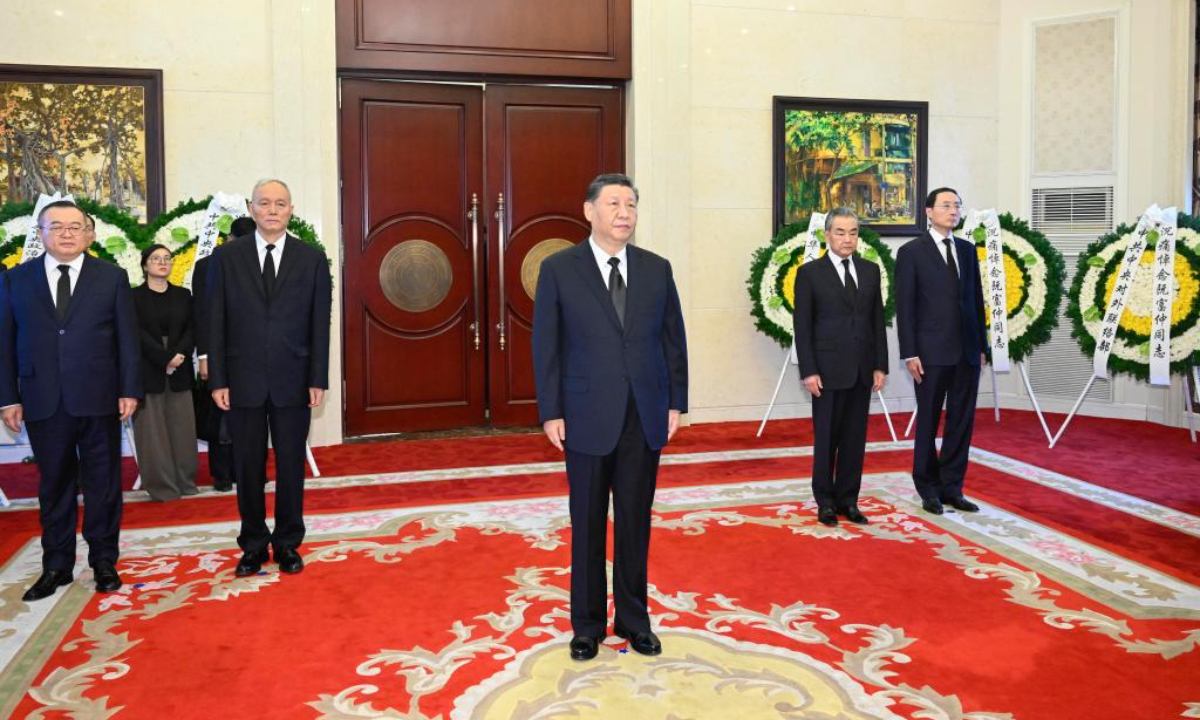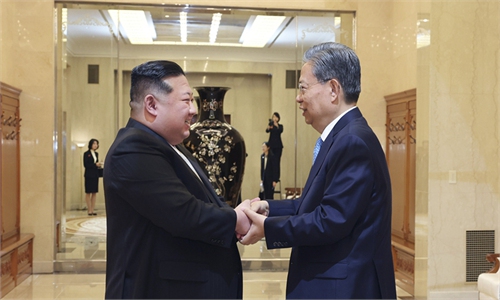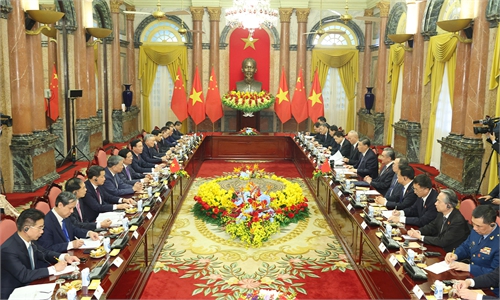Xi mourns passing of ‘staunch Marxist’ Nguyen Phu Trong
Vietnam expected to ‘retain diplomatic balance’

Xi Jinping, general secretary of the Communist Party of China Central Committee and Chinese president, mourns the passing of General Secretary of the Communist Party of Vietnam Central Committee Nguyen Phu Trong at the Embassy of Vietnam in China on July 20, 2024. Photo: Xinhua
Xi Jinping, general secretary of the Communist Party of China (CPC) Central Committee and Chinese president, on Saturday went to the Embassy of Vietnam in China to mourn the passing of General Secretary of the Communist Party of Vietnam (CPV) Central Committee Nguyen Phu Trong.
The CPC Central Committee on Friday sent condolences to the CPV Central Committee and said they deeply mourned the death of Trong. Analysts said that the condolences paid by the Chinese side show the depth of the traditional relationship between the two parties and two nations, and that CPC-CPV ties will continue to guide the development of China-Vietnam relations.
Vietnam will hold a two-day state funeral for Trong from July 25 to 26, the Xinhua News Agency reported on Sunday.
Chinese experts said they have confidence in China-Vietnam relations, and they believe the new CPV leaders will treasure and safeguard the legacy of Trong in the field of diplomacy that has maintained a balance between major powers and helped bring constant economic growth and development to the country.
Praising Trong as a staunch Marxist and a great leader of the CPV and the Vietnamese people, Xi said on Saturday that Trong had devoted himself entirely to the CPV and the country, to the Vietnamese people and to the cause of socialism in Vietnam, and had been deeply respected and admired by the party, military and people of Vietnam.
Xi recalled that over the past decade, he and Trong had maintained close contact and developed a deep camaraderie, and that last year they jointly announced the elevation of bilateral ties to a China-Vietnam community with a shared future that carries strategic significance, a milestone in bilateral ties.
"The passing of Comrade Nguyen Phu Trong has deprived us of a promoter of China-Vietnam relations and a companion for the cause of socialism, and we are deeply saddened," said Xi.
Xi stressed that the CPC and the Chinese government firmly support the CPV in uniting and leading the Vietnamese people to develop socialism that suits Vietnam's national conditions.
It is believed that under the strong leadership of the CPV Central Committee, the Vietnamese people will surely be able to turn grief into strength and continue to make greater achievements in the cause of reform, opening up and socialist construction, Xi said.
China and Vietnam are linked by mountains and rivers, have similar cultures and political systems, and are both building their countries through the path of socialism. China and Vietnam have very close economic and trade ties. Despite Trong's death, the general trend of China-Vietnam friendship will remain unchanged, experts said.
Zhao Weihua, director of the Center for China's Relations with Neighboring Countries at Fudan University, told the Global Times that the main principle of Vietnam's diplomacy is "to be friends with all countries." Vietnam is still implementing this policy and maintaining friendly relations with all major countries, including China.
"China has been Vietnam's largest trading partner, while Vietnam is also China's largest trading partner within ASEAN. Such close economic and trade exchanges are win-win cooperation for both countries," Zhao noted.
In fact, many Vietnamese politicians and scholars often discuss the principles of having a balanced diplomacy. Especially after the outbreak of the Russia-Ukraine conflict, as Vietnam has reached a consensus that it would not "lean to one side" and wants to develop good relations with all major powers at the same time, Zhao said.
"China has always regarded Vietnam as a priority in its neighborhood diplomacy and stands ready to work with Vietnam to continuously consolidate political mutual trust, strengthen solidarity and cooperation, and push forward the building of a China-Vietnam community with a shared future to benefit the two peoples and contribute to regional and world peace and development," according to the condolence message CPC Central Committee sent to CPV Central Committee.
Although China and Vietnam still have some problems when it comes to maritime issues in the South China Sea, this will not fundamentally challenge the whole bilateral relations, experts said.
The two parties and the two countries have effective channels to communicate and manage problems, and there is no reason for the new leaders in Hanoi to abandon the huge common interests that benefit the two peoples greatly and to take a huge risk of partnering with external forces to destabilize the region, experts said. We should be confident to the wisdom of the leaders of the two Parties and the two peoples, they noted.
Xu Liping, director of the Center for Southeast Asian Studies at the Chinese Academy of Social Sciences, told the Global Times on Sunday that the CPV will not change its successful diplomatic policy whoever becomes its new top leader, and China and Vietnam will further strengthen inter-party exchanges and pragmatic cooperation to increase mutual trust. A core interest and mission of the two sides is to jointly safeguard the socialist political system.




